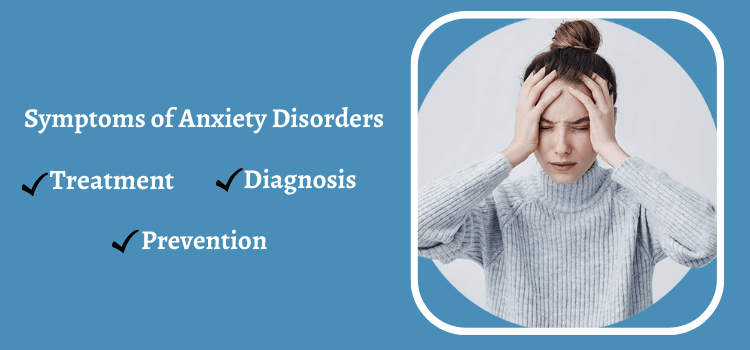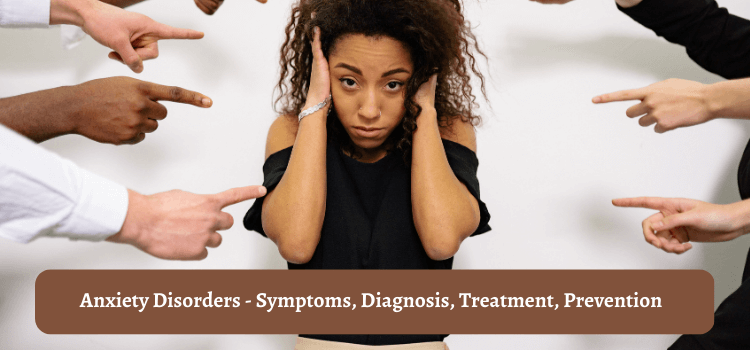Everyone experiences anxiety at times, but those feelings can get out of control if they don’t manage them. The body can respond to these feelings with physical reactions such as trembling, sweating, and nausea It’s important to know what triggers your anxiety so you can manage it effectively. This can help you live a better life.
Symptoms of Anxiety Disorders
Anxiety disorders are a group of mental health diagnoses that affect how people process emotions, think, and behave. They can cause excessive nervousness, fear, apprehension, and worry, as well as physical symptoms such as sweating, trembling, or shortness of breath.
The symptoms of anxiety disorders vary from person to person. Some have intense anxiety attacks that happen without warning, while others are constantly on edge and suffer from disabling fears and intrusive thoughts.

If you feel a lot of tension, worry, or fear that can’t be controlled, it may be time to seek help. Your GP can ask you about your symptoms and make an assessment to see if you have an anxiety disorder.
Generalized anxiety disorder (GAD) is a chronic condition that causes you to have constant and persistent feelings of worry or dread about a wide range of things. This can interfere with your life and can last for months or years.
You can develop anxiety disorders after going through a stressful or traumatic event, such as the abuse or death of a loved one. Your environment can also play a part.
Some of the physical symptoms of anxiety disorders can mimic those of other medical conditions, such as heart disease or hyperthyroidism, so it’s important to get a professional diagnosis to rule out an underlying physical illness.
Social anxiety disorder is an extreme fear or discomfort of being embarrassed, humiliated, rejected, or looked down on by others. This can make it difficult to go out in public or meet new people.
Your GP will consider how long you have had these symptoms and how severe they are to diagnose you with an anxiety disorder. You will be offered psychoeducation – usually six weekly sessions lasting two hours – and a referral to a mental health specialist for further evaluation.
Treatment for anxiety disorders can involve medicine, counseling, and other therapies, such as cognitive behavioral therapy (CBT). This type of therapy aims to challenge negative thinking patterns and beliefs that fuel your anxiety. It can also involve exposure therapy, where you gradually expose yourself to situations that you fear, using a fear hierarchy.
Diagnosis for Anxiety Disorders

When you visit a doctor for an anxiety disorder diagnosis, your healthcare provider will ask you about your symptoms and your medical history. They may also give you a physical exam and lab tests to make sure there is no other health problem causing your anxiety. They will then give you a psychological evaluation, which involves discussing your thoughts and feelings to help pinpoint the cause of your symptoms.
The causes of anxiety disorders aren’t fully understood, but they seem to involve a combination of genetic, environmental, and psychological factors. They are more common in people who have had a traumatic life event or who have been exposed to stress. They can also run in families and are more likely to occur in people who have certain personality traits.
A generalized anxiety disorder (GAD) is a condition that includes persistent, excessive worry about a variety of things. People with GAD typically experience their worries almost every day for at least six months and have three or more symptoms of the disorder.
Panic attacks are sudden, repeated episodes of intense fear that come on quickly and last several minutes or more. They can occur in a person’s everyday life and are often accompanied by other signs of the disorder, such as muscle tension, sweating, nausea, and diarrhea.
Phobias are fears of situations or objects that pose little or no actual danger. They can include spiders, flying, enclosed spaces, and going to crowded places. They can interfere with daily activities and lead to a significant reduction in a person’s quality of life.
Symptoms of anxiety disorders are often difficult to recognize or ignore, but they are treatable with help. A doctor or mental health professional will work with you to find a treatment plan that best fits your needs and lifestyle.
Diagnosing an anxiety disorder is important because it allows your healthcare professional to prescribe medication and therapy that can reduce the symptoms and improve your quality of life. Medications can also help manage mood problems that can accompany anxiety disorders, such as depression.
Treatment For Anxiety Disorders
Anxiety disorders are serious mental health conditions that can have a huge impact on your life. They can affect your mood, sleep, and appetite. Treatment may include medication, psychotherapy (counseling), or a combination of the two. It takes time and dedication to find the right treatment for you, but with patience and commitment, it can be possible to manage your anxiety symptoms.
Your doctor can diagnose an anxiety disorder by asking questions and examining your medical history. They can also run tests to rule out other health conditions that might be causing your anxiety.
They will then refer you to a psychiatrist, psychologist, or another mental health specialist. These doctors are trained to look for signs of an anxiety disorder and use tools such as a psychological evaluation to pinpoint the cause of your symptoms.
A psychiatrist can help you learn how to deal with your anxiety using a variety of treatments. The most common are medicine, cognitive behavioral therapy (CBT), and talk therapy.
In medicine, your doctor may prescribe medication that blocks certain chemicals in your brain called GABA. This neurotransmitter is responsible for calming you and relaxing your muscles. Antidepressants, including medications in the SSRI and SNRI classes, are often first-line treatments for anxiety disorders.
Other medications can be used to treat anxiety disorders, such as benzodiazepines. Benzodiazepines block a chemical called GABA, which can help reduce the symptoms of anxiety and relax you.
Medication is a common form of anxiety treatment, but it can cause serious side effects, especially if you are taking it along with other drugs. Make sure you talk to your doctor about the risks, benefits, and potential side effects of any medications.
Some people find it easier to manage their anxiety with other methods, such as relaxation techniques or a stress management plan. These can include meditation, mindfulness, or a stress-reduction exercise routine. They can also help you control your cravings for foods and drinks that can worsen your anxiety.
A therapist can help you identify the negative thoughts that are fueling your anxiety and replace them with more realistic thoughts. They can also teach you to replace irrational fears with logical expectations and positive statements about yourself.
Prevention Of Anxiety Disorders
Everyone experiences some anxiety and fear, but when these feelings linger on or are out of control they can interfere with everyday life. It may affect relationships with friends and family, and it can be a symptom of depression.
Your body reacts to a stressful situation by sending chemicals into the bloodstream that make you breathe faster, sweat more and feel tense. This is part of our ‘flight-or-fight’ response, which is our body’s way of dealing with impending danger. However, if this ‘flight-or-fight’ reaction is inappropriate for the situation that caused it, it can lead to an anxiety disorder.
Risk factors for an anxiety disorder include having a history of mental health problems or having experienced a traumatic event, like the death of a loved one or severe illness. Also, if you’ve been through sexual abuse, emotional or physical trauma, or have been in a relationship where you felt that you were not getting enough care and attention, you are at increased risk for developing an anxiety disorder later in life.
You can learn to control your anxiety symptoms by practicing relaxation techniques, such as meditation and mindfulness, keeping a journal, and managing your negative thoughts. You can also see a therapist or attend a support group to learn more about your anxiety disorder and share your experiences with others.
Some medications can help manage your symptoms. These include antidepressants and benzodiazepines (like diazepam, or Valium). They can help with both the physical and emotional aspects of your anxiety.
Other ways to reduce your symptoms are to eat well, get enough sleep and avoid alcohol or drugs. These can all help keep your anxiety in check and can improve your overall well-being.
If your symptoms are very severe, you should see a doctor who can assess them and determine the best course of treatment. They may refer you to a psychiatrist, psychologist, or another mental health professional for further evaluation.
Anxiety disorders are very treatable, but it may take some time to get to the root of your symptoms and improve them. Some people will need to continue treatment for many years, so it’s important to work with a therapist who understands your condition and can offer the best treatment.






Leave a Reply